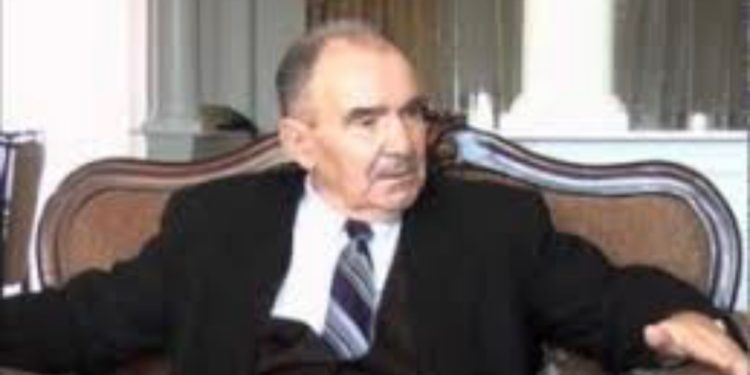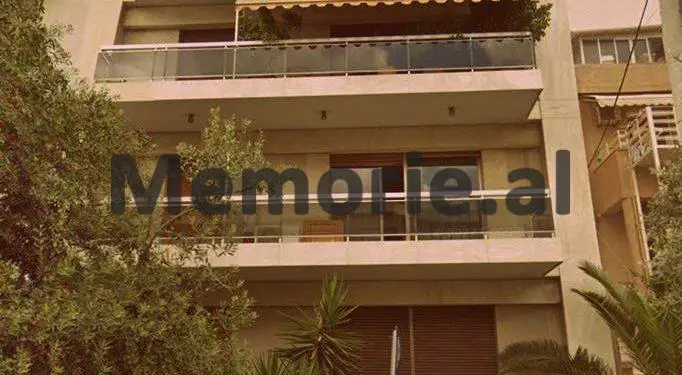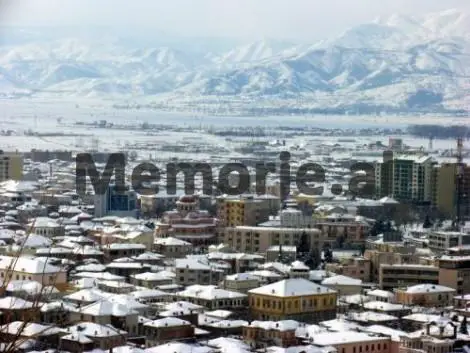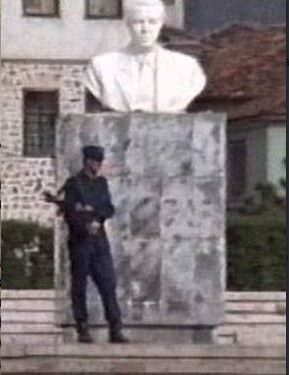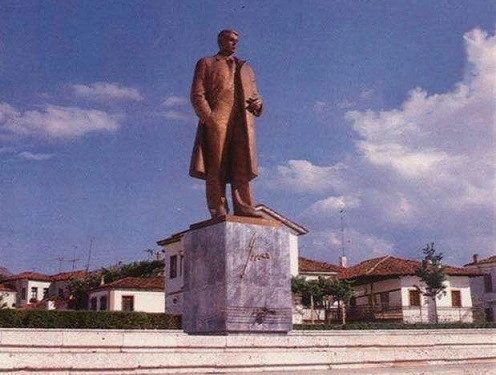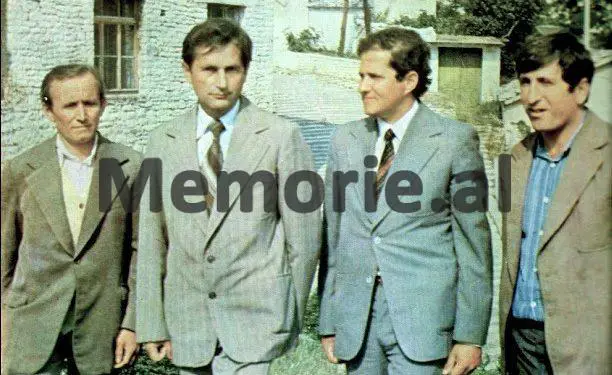By Vepror Hasani
Memorie.al / Spouses Namik and Pranvera Larti from the village of Bulgarec in the district of Korça are now quite old. They have not seen their son, Saimir Larti, for years and years, and they will never be able to see him. He was killed on September 17, 1991, by people from the former State Security. The perpetrators of this murder, who were also accused of the murders of April 2, 1991, in Shkodër, have not yet been found. It is not surprising that the same people killed Shkëlqim Agolli, the leader of SHIK in the district of Vlora in 1997. After 16 years, he remembers and tells the circumstances of the murder of Saimir Larti and the reasons why the Sigurimi people took revenge with The 21-year-old, Saimir’s father, Namik Larti, now 66 years old…?!
The news of horror…!
“I was at work when I found out that something serious had happened in my family. I didn’t know exactly what, but anyway the news went through my whole body. Someone told me that my wife was in a serious state of health. I left work and went to at home. Everything seemed strange to me. In the morning, when I left for work, I had left all the people in the family.
What happened to you?! When I arrived in my village, in Bulgarec, it was 19:30 in the evening, I noticed that there were many people near my house. Crying and wailing could be heard from far away. ‘Maybe my wife is dead’, I thought, and again a painful shudder took over my whole body”, began his confession, Namik Larti.
“Our life had many troubles. From the day the communists came to power, we had never had a happy day. The internment and arrests were nothing. For them, we had always been kulaks and nothing more. I approached A part of the people wanted to collect themselves and behave as if nothing had happened, while the women and girls gave it to the horse.
‘What happened I asked’?! My voice trembled, while my knees were cut. I had the feeling that the soul would not hold me anymore. Someone hastened to tell me again that my wife was sick. I tried to contain myself. I expected to find him dead, lying in the middle of the room,” Namiku continues.
“When I entered, I saw my friend, Pranvera, crying and screaming. She was covered in tears and pulling out her hair. My daughter, Mirela, who was 24 at the time, was doing the same. I looked at my son Drini , but he also had tears in his eyes. Only the eldest son, Saimir, was at home. He had gone to Greece, but I had talked to him two or three days ago and he told me that he was fine with work and health.
Then what had happened in my family?! At home I also found my sister Ruhia, who is no longer alive, but she was also unable to explain anything to me. The only words I heard from her were, ‘What did you find us, brother, what did you find us’?! A short moment had to pass when my brothers and the men of the village took me aside and told me to pull myself together and be a man.
Such disasters could happen to anyone. I listened scared and terrified and waited for what bad news they would tell me. And the terrible news came. “Your son, Saimiri, has died in Greece,” said Namik Larti amid longing.
“Something big broke in my soul, I wasn’t good at keeping myself. I had endured thousands of problems in my life, but at that moment, I didn’t want life anymore. ‘Who killed you, son…”?! I have the impression, that in the same way, the women who were waiting for the coffin to arrive, from Greece, were also crying…”! Namiku remembered.
Why was the boy dead?!
“The news of the death had run and entered my house, while the coffin was still there, in a suburb of Athens, in Iraklis. I did not want to believe anything. How could I believe the death of my son?! I only two or three I had talked to him on the phone the other day and Saimir had told me that he was fine. How could he have died so unexpectedly?! He was a healthy boy. He had never suffered from any illness.
“Didn’t you get it wrong”? I asked with a faded hope, hoping that someone from those who were there would tell me; ‘Yes, Namik, you are right, the news will not be correct’. I asked and fixed my gaze on everyone. But no one spoke. My son was dead. Women and girls wept bitterly, while men had tears in their eyes. They tried to hold themselves, but they couldn’t,” Namiku continued his tragic story.
“Saimiri was only 21 years old. About Saimir’s death, Saimir’s Greek owner, Katerina, informed the Albanian Embassy in Athens and the latter informed the Ministry of Foreign Affairs in Tirana. The news of my son’s death arrived in The Executive Committee of the district and from there to my house. The news had officially arrived, so no one hoped that Saimir was alive”, said Saimir’s father.
Saimir Larti
“Women were crying in Bulgarec of Korça, while the boy lay dead in Iraklis of Athens. It was said that the coffin would come the next day. We had not seen his face for 4 months. We missed him. Now we would not be able to hear , not even his voice. At that moment, I only remembered the conversations I had with him on the phone. He always told me, “Dad, I’m fine, don’t worry about me.”
This is what he used to say to his mother, Pranvera, sister, Mirela, and brother, Drini, but we were always worried. My wife, Pranvera, since the day Saimir fled to Greece, could not sleep a single night. ‘I’m afraid for Saimir’, she always told me, the Security people will find him there too”, Namik Larti continued his confession.
“Our son left for Greece, at dawn on May 28, 1991. He crossed the border in Kapshtica of Devolli, together with some other friends and entered Greek land. He could not stay in the village of Bulgarec. He had been a from the participants of the demolition of the dictator Enver Hoxha’s monument in Korça, I remember that day like today.
It was February 20, 1991. I was at home when I heard on the news that in Korça, the monument of the dictator Enver Hoxha had fallen. I felt excited. ‘They toppled the dictator’s monument,’ I said to the woman and went outside to find out if others had noticed this too.
I suddenly remembered that there, in Korça, would be my son, Saimir. Since the day when the students of December appeared on the stage, Saimiri was present in every democratic movement. He had been in Korça on December 30, 1990, when Sali Berisha had also arrived, for the creation of the branch of the Democratic Party. He was also the initiator of the creation of the PD section in Bulgarec, together with Ali Agolli, Tomor Zotbejas, Arben Malo, etc. Everyone had heard the news of the monument’s collapse.
They told me that, during the collapse of the monument, many young people were injured. The police tried several times to repel them, but the crowd did not retreat. “You don’t know what will happen next”, – my fellow villagers were telling me! – It is said that all those who were at the front of the crowd will be arrested, word has spread that the State Security has filmed everything. It is even said that after midnight, the arrests will begin. All these made me leave for Korça. I wanted to know what was happening with my son, Saimir”, recalled Saimir’s father, Namiku, about the bad premonitions.
The police had injured the boys
“When I arrived in Korça, I went straight to my brother Seiti’s house. When I entered, I noticed that Saimri was there, together with his cousin, Oliver Lartin. My son, he was a little better, but Oliver, he was bleeding. We faced the police, – they told me, – there were many wounded. The police were shooting with all means, but it was impossible to stop us .We threw the steel stake around his neck and after that, we toppled the infamous statue.
We dragged him through the streets of Korça. – ‘It was a big party, father,’ said Saimiri. I listened and was happy, but already I was afraid of boys. ‘They say the arrests will start at midnight,’ I told the two boys, Saimir and Oliver, but they didn’t want to believe it. ‘Communism has already collapsed, no one will dare to harm us’, they were explaining to me”, referring to the conversation after the collapse of the bust of the dictator, Namik Larti.
But what was said was true. After midnight, the arrests began. The State Security people knocked door to door and arrested all those who had put the stake in the throat of the dictator. They dragged them, beat them and tortured them. Across the street, gunshots could be heard. For this reason, that night we stayed there. The next day, my brother Seiti and I hid the two boys in a safe place.”
Enver’s volunteers
“It was dawn on February 21, 1991. The Security people were furious. The fall of the monument was their fall. In the village of Bulgarec, many communists had gathered. The associations of “Enver’s Volunteers” were being formed. They passed through the streets of the village and shouted , ‘Party- Enver, we are always ready’. ‘Enver is alive’, ‘Saimir kulak, on the rope’.
“We didn’t hang them then, but we will hang them now.” ‘All the kulaks are on the rope’. The situation was very difficult. “Enver’s volunteers” had appeared everywhere, even in the streets of Korça. With his portrait, they threw slogans at every moment. A woman shouted, ‘We also give honor, but we don’t give Enver’. A kennel of lunatics and spies, roaming from all sides”, Namik Larti further recalled.
“I left the house and went to work. When I arrived in Maliq, (at that time, but all my life, I worked as a miner in a quarry), the Party Secretary told me: ‘Your son, he has blackened the face of all of us. He together along with others, have torn down the monument of our beloved leader Enver Hoxha. For this reason, – said the Party secretary, – we ask you, Namik, to take Enver Hoxha’s portrait and, together with others, raise it up there where Enver’s monument was.
This will mean a lot. The son really brought him down, but the father raised him up. You will be honored Namik. Everyone will follow your example’. He took the portrait and held it close to my hand. I took a step back. ‘Please don’t bring that portrait near me,’ I said. That man has not loved me for 50 years, so I have never loved him either. Please, take that portrait away from me, because I can’t stand it’.
After that I left the office, while outside I could hear the screams of the crazy kennel shouting, ‘We also give the honor, but we don’t give Enver’. I was already sure that the Security people would take revenge on us. All these came to mind when I heard the women crying in my house and saying, ‘They killed you, Saimir, they killed you, son,'” Namik Larti continued the story.
In those days after the fall of the statue, we were under threats for several days, but then the situation calmed down. We decided to send Saimir to Greece, in order to be as far away from the Security people as possible. “Since the day the monument was demolished, spies were looking for our boys.”
Saimiri in Athens
“My wife was crying, remembering the day we escorted him to Greece. ‘I told you, son, to beware of murderers,’ was her voice. As I said a little while ago, the son left at dawn, on May 28. He passed the border and then he traveled to Athens. We were waiting for him for a while, when he called us and told us that he had started working as a waiter in the neighborhood “Iraklis” of the capital also said that the owners were good.
We were overjoyed. By now he had gone too far from the eyes of the ex-Security people, but we were wrong. They would find you in every corner of the world wherever you were. We ordered him to call us repeatedly and he kept his word. He called us often. When he received the first lek, I send it home. Then he also sent us a tape recorder. He tried to help us, because in reality, we were very poor. Everything was going well. Two or three days before I heard the news of the boy’s death, I had spoken to him on the phone”, said Namik Larti.
“But now he was no longer alive. How was it possible?! They had killed him…?! But until that moment, no one had said that there were signs of bullets or knives found in Saimir’s body. But also natural death , it was unbelievable. He had never suffered from any disease!
I thought about all these moments, when the people who came to comfort me, asked me how the boy’s death had happened, but I had no answer. I didn’t know anything,” he continued, talking about the hours of waiting for the lifeless body of his son, Namiku. “The son came to us in the coffin the next day. I took him out of the coffin and checked his whole body. There was no sign. Saimir Larti was really dead”?!
The unraveling of the mystery begins
“Even though a few days had passed since the funeral ceremony, the situation in the family was quite difficult. My wife, Pranvera, daughter Mirela and my little son, Drini, who was only 14 years old at the time, were experiencing difficult days All our relatives were in the same situation. No one believed that he had been killed, but how, we had no explanation peace, as they have not found even to this day.
40 days after the son’s death, I started to investigate. I called the boy’s Greek owner, Katerina, who also knew the Albanian language well. She knew something, but not much. The boy’s death had been very mysterious. Two people entered Katerina’s bar, where Saimiri worked as a waiter. They were young. Without claiming their exact ages, Katerina said they must be in their 30s. The two people who entered the bar spoke Albanian. From the first moment, they tried to pass themselves off as patriots. For Saimir, those two mysterious people were unknown.
Saimir had been in Athens for no more than four months, and his acquaintances were few. In addition, he never left the bar, except on rare occasions when he met his Bulgarian relatives. There was something false in the behavior of the two young men, especially the attempt to pass themselves off as patriots. There they met Saimir. “I know Albanian, said Katerina, and I listened to everything they were talking about, but then they sat down at one of the tables in the bar.” As long as those two people stayed there, I followed their every move.
I don’t know why I got the impression that both of them were not good people. During the time that the three stayed together, one of the two newcomers took out the package and handed a cigarette to Saimir, the latter took it and lit it. I wanted to tell Saimir not to smoke that cigarette, but at that moment I couldn’t. I told him all this later, ordering him not to take anything from people he didn’t know. After exchanging cigarettes, the two unknown people left the bar. It didn’t take long, – said Katerina and Saimiri was feeling bad.
He had a seizure, a little later he had a hemorrhage that did not stop. It fell off the table. It was clear that something had happened to him. I picked him up and rushed him to the hospital. After the medical help he received there, Saimiri started to feel better. He didn’t want to stay in the hospital anymore. He went back to the bar, but even the next day, he looked quite tired. I can’t say he complained, though, because he wasn’t one to complain. After two or three days, he died. I don’t know how it happened, he worked until the evening, then he went to his room, which is inside the bar where he worked, and lay down to sleep.
Only in the morning I noticed that he was not going to work. I went worriedly to his room, but there I found a lifeless body. Saimir was dead. I am not sure what time this happened. After that, I informed a relative of Simir, Arben Malon, who worked in Athens, but in the meantime I also informed the Albanian Embassy in Greece. I couldn’t do more, and what could I do?’. This was the story told by Katerina”, recalled the story of the boy’s owner, Namik Larti.
“My son’s coffin was brought by Arben Malo, who is our relative, together with two others. Arben said that Saimir should have died after midnight, since he had called him at 00.00 at night and Saimir He had told her that he was fine and that there was nothing to worry about. However, our son had died very mysteriously.
Malo and others had also gone to the Albanian Embassy in Athens to ask for help in transporting Saimir’s dead body, but the ambassador had given them a firm answer. ‘Throw it where you want, we have no responsibility for it. He was an illegal immigrant.’ All this, the unbearable pain, made us even greater”, said Namik Larti, not without anger.
Assassins of Saimir Larti
“Anyway, I couldn’t give up on finding the truth about the boy’s death. I first turned to the Foreign Ministry, where I had to go several times in a row, waiting for an answer. When enough time had passed, I got the answer “Saimir Larti was killed by people from the former State Security Directorate. Saimir Larti was killed for political reasons”. , to ask for help in solving the murder of the boy.
They promised me that they would catch the perpetrators of my son’s murder, but this has not happened to date. A lot of time has already passed, but I know that in that group of killers, there were also people from the Korca district. It is not surprising that Shkëlqim Agolli, the leader of SHIK in Vlorë during the riots of 1997, was also killed by the same people, who was found murdered under very mysterious circumstances in Greece.
However, I still have hopes that the perpetrators of the murder will be brought to justice one day. On the fifth anniversary of the demolition of the dictator’s monument, Enver Hoxha, the President of the Republic of Albania, Prof. Dr. Sali Berisha decorated my son with the “Martyr of Democracy” medal. Now the Korçë District Council has approved the declaration of Saimir Larti, ‘Martyr of the Fatherland’. However, every day I expect to hear the murderous names of my son”, said Namik Larti.
The story of the Larti family, which was brutally persecuted by the communist regime
The early origin of the Larti family is from the village of Kolanec in the Korçë district. Then the four brothers, Ismaili, Avdyli, Pashoja and Ahmeti, who at that time bore the surname Bazelli, settled in the village of Maliq. That they were all patriots. A part of them would move to the village of Bulgarec, with the surname Larti, thus emphasizing their origin. Ismaili is known as the initiator of the opening of Albanian schools, in the province of Gora, while Pahoja, but also Ismaili, had fought against the Ottomans, as well as against the Greeks, in 1916. He was a comrade-in-arms of Themsistokli Gërmenji and his friend.
Fetah and Ibrahim Kodra, relatives of the Larti family, were couriers of Themistokl Germenji, from Korça to Vlora. Until the invasion by Italy, Pasoja had been an officer in the Albanian army. Together with the sons of his brother, Ahmet, he had to fight against the Italian occupation. Since 1939, he was put in charge of Gora’s nationalist squad. He never agreed to cooperate with the communists. This was also requested in 1943, but he again refused.
With the creation of the “National Front”, Pahoja joins Baba Zylfo and Sabri Panariti, thus creating his squad. He was arrested in 1945, where he was cruelly tortured in the dungeons of the Sigurimi. They sentenced him to death. When they were taking him to “Teboja” in Korça, in front of the firing squad, just beyond the “Graves of the French”, he called his relatives, who were following him from afar; “Don’t drink coffee for me, but take out the sugar, because very soon the day will come when communism will be overthrown.”
Along with Pasho, his nephew Asim Bazelli was also sentenced. Another grandson, Karafil Larti, Saimir Larti’s grandfather, would have the same fate. He was convicted because he had told the partisans that now that the country had been liberated, Albania had to rely on the Anglo-Americans. When the cooperatives were created, the people of the Larti (Bazelli) tribe were told, you will join the cooperative, but you are not like other people, because you are kulaks. You have no right either to choose or to be chosen.
Then, Petrit Bazelli, Skënder Nevruz Malo was arrested, who went crazy in prison and was eventually taken to Elbasan Psychiatry. So tragic was the life of Skënder Malo, a member of this tribe, who had to escape from the military ward 2200 (forced labor ward) in Dushk of Lushnja, but arrived in the village of Rajcë, very close to the Thana Pass , they caught him. From torture and suffering, he went mad. Petrit Bazelli was arrested unexpectedly in 1980 and sentenced to 10 years in prison for agitation and propaganda. All this would come to an end, only without the collapse of Enver Hoxha’s dictatorial regime. Memorie.al




